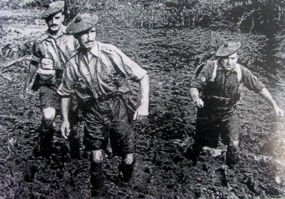History of the Stewarts | Famous Stewarts
If you are a Stewart Society Member please login above to view all of the items in this section. If you want general information on how to research your ancestors and some helpful links - please look in background information.
If you have a specific question you can contact our archivist.
Brigadier Ian M Stewart of Achnacone

Stewart was commissioned into the Argyll and Sutherland Highlanders in February 1914 when the regiment was at Fort George and served throughout the First World War. During this war, he was awarded the Military Cross and Bar, and created an Officer of the Order of the British Empire (OBE). At the end of the war, Stewart was a Temporary Captain. He became heir to Achnacone after his older brother, Captain Alexander D.L. Stewart MC, died in a motor cycle accident in Dublin in 1919.
On 8 September 1931, Stewart was promoted to major. Stewart´s military career was dominated by his service with the Argylls. Stewart had married Ursula Morely-Fletcher in 1937 when he was 42 years old.
At the beginning of the Second World War Stewart was still in command of the 2nd Battalion of the Argylls. Stewart was one of the few British officers to realise the need for training in jungle warfare that would be necessary in order to defeat the Japanese in a war in Malaya. In early 1941 after his battalion had been transferred from India to Malaya, Stewart began training his men and developing new tactics. When the 2nd Argylls were thrown into the battle in early December 1941 they were to prove one of the few effective units the Japanese would face in their rapid advance down the peninsula, inflicting heavy casualties in every engagement. Sadly their effectiveness meant that they were continuously used as the buffer and suffered massive casualties as a result.
Stewart was temporarily given command of the Indian 12th Infantry Brigade after Brigadier Paris took over the Indian 11th Infantry Division in late December 1941. He was in command of this brigade during the disastrous Battle of Slim River which was where the Argylls suffered their worst casualties. When the Battle of Malaya finally ended and the surviving Allied soldiers retreated across the causeway onto Singapore Island, Stewart and his batman, Drummer Hardy, were the last to cross.
The 250 surviving Argylls were reformed with 210 Royal Marines, survivors from the H.M.S. Prince of Wales and the H.M.S. Repulse, becoming known as the Plymouth Argylls . The Plymouth Argylls suffered heavy casualties during the brief Battle of Singapore. A few days before the fall of Singapore, General Wavell, Supreme Commander in the South West Pacific, ordered Brigadier Stewart to be flown out to report to him in person on the true state of affairs in the Malayan peninsula and about the impossible situation in which the British Army found itself. Stewart therefore was not captured by the Japanese.
What was left of the Plymouth Argyll Battalion, under the command of three captains, were marched into captivity behind their piper.
On 23 January 1942, Stewart was awarded the Distinguished Service Order (DSO) for his services in the South West Pacific area. He was initially employed as a General Staff Officer Grade 1 in India, lecturing on his experiences in Malaya. Officers with jungle warfare experience who had actually fought the Japanese and seen their tactics in action were in high demand by the army command in India. Of all the officers to have escaped from Singapore, Stewart was probably the most experienced. Stewart´s report, written after his arrival in India, and his knowledge along with that of the other officers and men who escaped from Singapore, had a direct effect on the training and tactics that would be used by the British and Commonwealth Armies in fighting the Japanese throughout the rest of the war
Stewart returned to the United Kingdom in early 1945, being given command of the 144 Infantry Brigade on 19 March 1945.He spent a period of time as the District Commander for Stirling, the home of the Argyll and Sutherland Highlanders.
Stewart retired from the army on 13 April 1947 at the age of 52, a short time after the death of his father. Stewart was a substantive colonel on retirement but was awarded the honorary rank of Brigadier. Stewart wrote the book ´The Thin Red Line, 2nd Argylls in Malaya´. He became well known in the Scottish farming community, and became President of the National Farmers Union of Scotland. He was also a life long member of the Society and was the President.
Stewart died on 14 March 1987 at the age of 91.
Reference: Appin of Yesteryear

